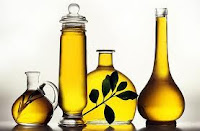The Healthy Taste of Olive Oil. Would the Flavor Be Enough to Induce At Least Some of Its Health & Satiety Effects? Plus: Cholesterol Control - Pomace vs. Refined Olive Oil
 |
| What about an EVOO perfume, then? |
I guess, Sabine Frank and almost a dozen of other scientists from Germany and Austria must have had a similar idea, when they came up with the research question of their most recent study.
Olive oil flavored yoghurt?! Really?
I suppose, olive oil flavored, or, more specifically, low-fat yogurt mixed with a fat-free aroma extract from olive oil may not sound appealing to the average Western customer, but it would certainly deserve the label "functional food":
 |
| Figure 1: Only the olive oil enhanced yogurt will also enhance the activity of the frontal operculum (Frank. 2013) |
"What is the "frontal opercular" and why would I care about its blood supply?"
If the subheading to this paragraphs describes what you are thinking right now, it's about time to take a look at the little information we have about the frontal operculum:
We know from previous studies that the frontal operculum (FP) is sensitive to food intake.Suggested read: "Pimp My Olive Oil! When Virgin is not Phenol-Rich Enough: The Pharmacokinetics of Phenol-Enriched Virgin Olive Oil." | read more - The study at hand shows that the FP does not care about caloric values (the yogurts were isocaloric).
- In task-related studies, the frontal operculum as part of the primary taste cortex, has shown pronounced activation to visual food cues and anticipation of food intake.
- The activation of the frontal operculum appears to control the "this smells good" or "this looks good, I must have it" response that makes weight loss so difficult.
- There is a telling relation between the sensitivity of the frontal operculum and the BMI of a person (Batterink. 2010; Yokum. 2011)
- Earlier fMRI studies showed that oral delivery of a drop of fat leads to an immediate increase in insular and frontal opercular activity, which suggests that there are "fat taste receptors" somewhere in the oral cavity or digestive tract that are wired to the the frontal perculum (Small. 2012).
 |
| Per capita consumption of vegetable oils and fats in selected European countries in 2009 (Eurostat. 2011) |
In fact, the "ideal" diet, with the perfect macros and 100% adherence could in the end turn out to produce inferior results to a "sub-optimal", but tasty diet with olive oil and other aromas triggering all-sorts of still to be elucidated beneficial downstream effects on our physiology and psychology.
- Batterink L, Yokum S, Stice E. Body mass correlates inversely with inhibitory control in response to food among adolescent girls: an fMRI study. Neuroimage 2010;52:1696–703.
- Cabello-Moruno R, Martinez-Force E, Montero E, Perona JS. Minor components of olive oil facilitate the triglyceride clearance from postprandial lipoproteins in a polarity-dependent manner in healthy men. Nutrition Research. Oct. 2013 [accepted manuscript]
- Small DM, Green BG. A proposed model of a flavor modality. In: Murray MM, Wallace MT, eds. The neural bases of multisensory processes. Boca Raton, FL: 2012
- Yokum S, Ng J, Stice E. Attentional bias to food images associated with elevated weight and future weight gain: an FMRI study. Obesity (Silver Spring) 2011;19:1775–83.




